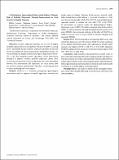| dc.contributor.author | Cetrone, Hollyn | |
| dc.contributor.author | Santoso, Marianne | |
| dc.contributor.author | Petito, Lucia | |
| dc.contributor.author | Bezner-Kerr, Rachel | |
| dc.contributor.author | Blacker, Lauren | |
| dc.contributor.author | Kassim, Neema | |
| dc.contributor.author | Mtinda, Elias | |
| dc.contributor.author | Martin, Haikael | |
| dc.contributor.author | Young, Sera | |
| dc.date.accessioned | 2023-10-03T07:50:57Z | |
| dc.date.available | 2023-10-03T07:50:57Z | |
| dc.date.issued | 2020-06 | |
| dc.identifier.uri | https://doi.org/10.1093/cdn/nzaa053_024 | |
| dc.identifier.uri | https://dspace.nm-aist.ac.tz/handle/20.500.12479/2091 | |
| dc.description | This research article was published in the Current Developments in Nutrition Volume 4, Supplement 2, June 2020 | en_US |
| dc.description.abstract | In 2015, depressive disorders led to over 50 million disability-adjusted life years lost globally, with more than 80% occurring in low- and middle-income countries. Depressive disorders are also risk factors of a number of adverse maternal and child health outcomes. To our knowledge, the Singida Nutrition and Agroecology Project (SNAP-Tz), is the first nutrition-sensitive agriculture (NSA) intervention identified to improve women’s probable depression (2020). Food security has been posited to play an important role in the relationship between NSA interventions and depression, yet causal factors have not yet been analyzed quantitatively. Therefore, we investigated food security’s mediating role on this impact. | en_US |
| dc.language.iso | en | en_US |
| dc.publisher | Elsevier | en_US |
| dc.subject | Research Subject Categories::NATURAL SCIENCES | en_US |
| dc.title | A Participatory Agroecological Intervention Reduces Women’s Risk of Probable Depression Through Improvements in Food Security in Singida, Tanzania | en_US |
| dc.type | Article | en_US |

